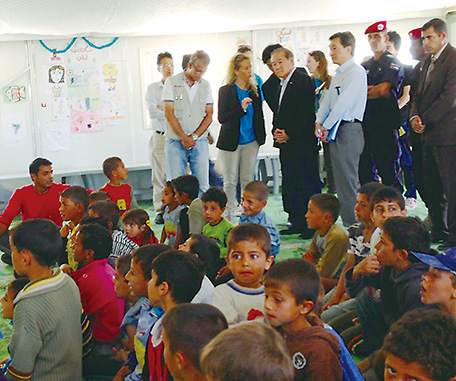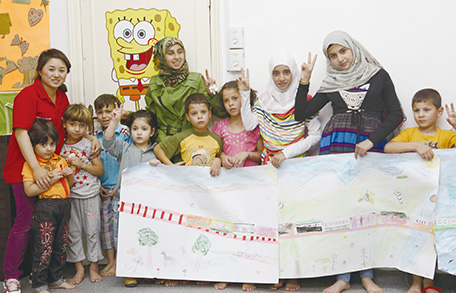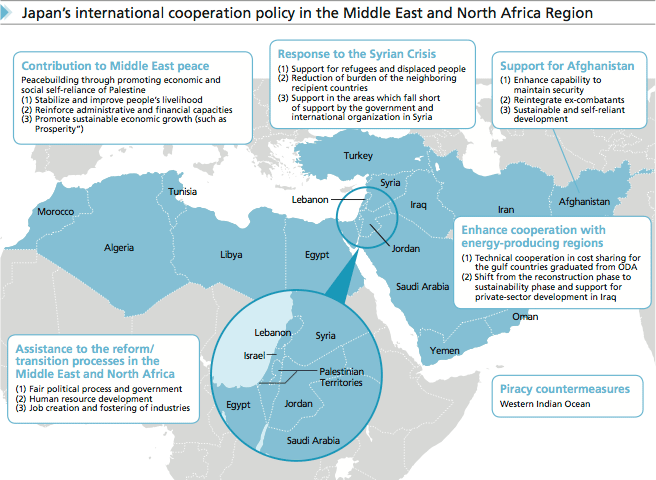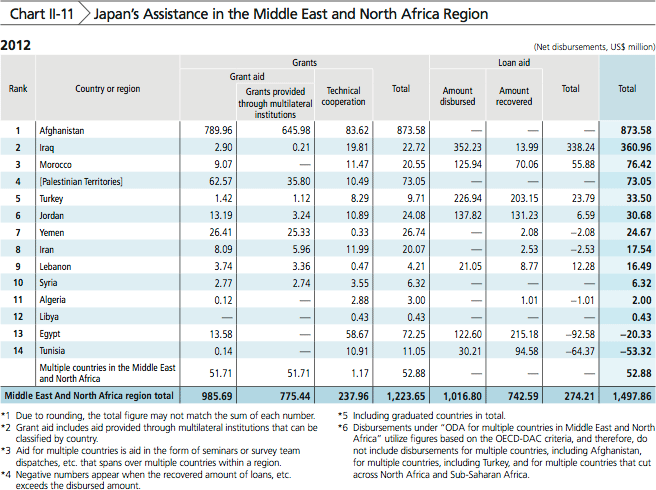Japan's Official Development Assistance White Paper 2013
4. Middle East and North Africa
The Middle East and North Africa region is a huge supply center for the world’s energy; it contains about 50% of both the world’s oil reserves and the world’s natural gas reserves. Japan depends on the Middle East and North Africa for about 90% of its crude oil imports, and the core sea trading routes linking Japan and Europe pass through the region. Thus, the Middle East is an exceptionally critical region for Japan’s economy and energy security as well.
The region experienced major political upheaval from 2011 to 2012. The democratization process is proceeding in the countries where longstanding regimes collapsed. However, economic and social conditions still have not improved, and the real fight for reform lies ahead. Encouraging reform efforts in such countries through financial assistance and contributing to stability in the region leads to peace and stability not only in those countries and their neighbors, but also in the entire world. Some countries in the region still face unstable situations. In Syria, suppression and violence are continuing even after two years have passed since March 2011, generating huge numbers of refugees and displaced persons. In addition, in August 2013, chemical weapons were used in Syria, resulting in the death of many civilians. Such situations are causing serious humanitarian issues. Japan has implemented humanitarian assistance of approximately $95 million that it pledged previously, and it has also decided to provide approximately $120 million in ODA loans to Jordan. Furthermore, at the UN General Assembly in September 2013, Japan pledged to provide an additional $60 million in humanitarian assistance.
Moreover, it is the feature of the region that there are many countries which continue to see high economic growth with large young populations, and it is also important to support these promising countries so that they can continue to achieve stable growth.
<Japan’s Efforts>
In the Middle East and North Africa, there are many countries and regions with devastated living and social infrastructure and security problems including the Palestinian issue, Afghanistan and Iraq. Since peace and stability in these countries and regions might have a huge impact on the stability and prosperity of the region and the international community as a whole, it is vital for the international community to support these countries and regions for the achievement of sustainable peace and stability, and nation-building, and national reconstruction. With this view of such characteristics of the Middle East and North Africa, there is significant meaning in Japan’s proactive support.
Starting in Tunisia in December 2010, citizens frequently staged massive demonstrations all around the Middle East and North Africa. The governments must not only move towards “democratization,” but must also overcome many socio-economic problems (high unemployment, rising food prices, widening gaps between the rich and the poor, etc.). That means the countries in the region are facing a critical period. Achieving such reforms and transition to new systems in a stable manner is also vital to the establishment of peace and stability in this region. This requires a higher degree of assistance from the international community as well. At the G8 Deauville Summit, France held in May 2011, the G8 leaders called the historic changes taking place in the Middle East and North Africa the “Arab Spring,” welcoming these changes and affirming the G8’s collective support for the efforts.

In May 2013, former Parliamentary Senior Vice-Minister for Foreign Affairs Shunichi Suzuki visited a facility for the children in a refugee camp in Zaatari, which accepts the largest number of Syrian refugees.
Economic circumstances in the Middle East and North Africa vary, from high-income oil-producing nations to low-income Least Developed Countries and countries that are in a period of post-conflict reconstruction. Japan believes that achievement of peace and stability in Afghanistan and Iraq, and achievement of Middle East peace, are issues related to the peace and security of the overall international community, and have deep significance from the standpoint of human security and peacebuilding, both of which are basic principles of Japan’s ODA Charter. Japan therefore provides active assistance to these regions, working together with the international community. For oil-producing countries, by promoting the diversification of industry as well as maintaining steady economic growth, Japan cooperates in the countries’ efforts to build stable economic foundation while moving away from oil dependent economies.
For low-and middle-income countries that lack oil and other natural resources, Japan continues to provide assistance to reduce poverty and achieve sustainable economic growth. In particular, at high-level meetings (those from the G8 Summit in Deauville onward) Japan announced its policy to respond to the changes taking place in the regions while working with the international community, and support Middle Eastern and North African countries’ own self-help efforts for stable transition and various domestic reforms by working in close partnership with the private sector, as well as with relevant government-affiliated agencies, building on its past experiences in contributing to the growth and stability of Asia.
The policy is based on the following measures: supporting (i) fair political process and government, (ii) human resource development, (iii) job creation and fostering of industries, and advancing (iv) economic relationships and (v) mutual understanding. In that vein, Japan pledged $1 billion of ODA loans in September 2011 and has already determined or pledged to support $1.4 billion of new infrastructure improvements. Further, in May 2013, Prime Minister Shinzo Abe announced that Japan would provide assistance amounting to $2.2 billion to support stabilization and democratization in the Middle Eastern and North African countries during his visit to Saudi Arabia. Japan, giving appropriate consideration to the areas of assistance and target priorities in each country, proactively supports building the environment to facilitate socio-economic stability in the region and to achieve Middle East peace.
The points of focus are as follows:
1. Peacebuilding assistance (Iraq, Afghanistan, Palestine)
2. Middle East peace process (assistance to the Palestinians, aid to the surrounding Arab countries, etc.)
3. Fair political process and government (including electoral assistance in Egypt and Tunisia, addressing disparity and enhancing stability by implementing aid projects in such areas as rural development, poverty reduction, water resources development, disaster risk reduction, and counter-terrorism and security)
4. Human resource development, socio-economic infrastructure development for job creation and fostering of industries
●Jordan
Assistance for Host Community of Syrian Refugees
Japan Overseas Cooperation Volunteers (JOCV)
Large numbers of Syrian refugees, estimated at up to 530,000 people, have been flowing into Jordan due to instability in its neighboring country, Syria (as of end of September 2013, UNHCR).
For assisting host communities of Syrian refugees, Japan has been providing various supports with the aim of supporting both Syrian refugees and Jordanian citizens in the Zaatari refugee camp and other host communities.
The assistances have been implemented at the grassroots level such as the deployment of Japan Overseas Cooperation Volunteers (JOCVs), the distribution of emergency aid supplies in the refugee camp, and the provision of equipment and materials to schools and hospitals in host communities. Seven JOCVs have been dispatched to Jordan (as of end of September 2013) and are working at either the refugee camp or in host communities, making the most of their specialties in public health nursing, physiotherapy and preschool education.
The JOCVs working at child welfare centers provide children with mental and physical care through teaching literacy and numeracy to children and giving them lessons on gymnastics. With some of the children having been traumatized by the severe conflict in Syria, the work of the JOCVs helps them cope with their ordeals. In addition, facilities for people with disabilities protected refugees who suffer from the aftereffects of injuries from gunshots and explosions in Syria due to limited access to adequate medical treatment. The work by the JOCV physiotherapists at the facilities has been greatly helpful for these refugees.

A JOCV who is actively involved at a host community (preschool education) and Syrian refugee children (Photo: JICA)


